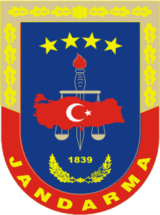Turkish Gendarmerie
| Gendarmerie General Command Jandarma Genel Komutanlığı | |
|---|---|
|
Emblem of the Gendarmerie General Command (Turkish Armed Forces portal) | |
| Active |
1839 – present (176–177) years[1] |
| Country |
|
| Type | Gendarmerie |
| Role | Paramilitary law enforcement, counter insurgency, armed response to civil unrest, counter terrorism, special weapons operations. |
| Size |
276,320 sworn members[2] 1,475 Armored and utility vehicles 59 Helicopters |
| Part of |
Ministry of the Interior (in peacetime) Turkish Armed Forces (in wartime) |
| Headquarters | Ankara |
| Colors | Red & Blue |
| Website | jandarma.tsk.tr/ |
| Commanders | |
| Commander-in-Chief | President Recep Tayyip Erdoğan |
| Minister of the Interior | Minister Efkan Ala |
| Chief of the General Staff | General Hulusi Akar |
| Commander | General Galip Mendi |
| Chief of Staff | Lt. General İbrahim Yaşar |
| Insignia | |
| Flag |
 |
| Branches |
|---|
| History |
| Special forces |
|
| Member of |
| Current overseas deployments and missions[3] |
The Turkish Gendarmerie (Turkish: Türk Jandarması) is a service branch of the Turkish Armed Forces responsible for the maintenance of the public order in areas that fall outside the jurisdiction of police forces (generally in rural areas), as well as assuring internal security and general border control along with carrying out other specific duties assigned to it by certain laws and regulations. The Gendarmerie is essentially a governmental armed security and law enforcement force of military nature.
It also operates the Askeri İnzibat provost service, policing the armed forces and two special forces brigades called Jandarma Özel Harekat Komutanlığı and Jandarma Özel Asayiş Komutanlığı.
As a part of the Turkish Armed Forces, the General Command of the Gendarmerie is subordinate to the Turkish General Staff in matters relating to training and education in connection with the Armed Forces, and to the Ministry of the Interior in matters relating to the performance of the safety and public order duties. The Commander of the Gendarmerie reports to the Minister of the Interior.
The Gendarmerie has its roots in the Ottoman Empire military law enforcement organization "Subaşı" (later known as the "Zaptiye"), which carried out security and safety services. A similar, earlier force was called "Şurta" during the medieval Seljuq Empire.
History
Ottoman era
After the abolition of the Janissary corps of the Ottoman Empire in 1826, military organizations called Asâkir-i Muntazâma-i Mansûre, Asâkir-i Muntazâma-i Hâssa, and, in 1834, Asâkir-i Redîfe were established to deliver security and public order services in Anatolia and in some provinces of Rumelia.
Since the term Gendarmerie was noticed only in the Assignment Decrees published in the years following the declaration of Tanzimat in 1839, it is assumed that the Gendarmerie organization was founded after that year, but the exact date of foundation has not yet been determined. Therefore, taking the June 14 of "June 14, 1869", on which Asâkir-i Zaptiye Nizâmnâmesi was adopted, June 14, 1839 was accepted as the foundation date of the Turkish Gendarmerie.[4]
After 1877–1878 Russo-Turkish War, Ottoman prime minister Mehmed Said Pasha decided to bring some officers from Britain and France to establish a modern law enforcement organization. After the Young Turk Revolution in 1908, the Gendarmerie achieved great successes, particularly in Rumelia. In 1909, the Gendarmerie was affiliated with the Ministry of War, and its name was changed to the Gendarmerie General Command (Ottoman Turkish: Umûm Jandarma Kumandanlığı).
Gendarmerie units both sustained their internal security duties and took part in the national defence at various fronts as a part of the Armed Forces during the World War I and the Turkish War of Independence.
Republic of Turkey
The Gendarmerie organization achieved its current legal status after Law No. 1706 entered into force on June 10, 1930. In 1939, the Gendarmerie organization was restructured, having three groups: Fixed Gendarmerie Units, Mobile Gendarmerie Units, and Gendarmerie Training Units and Schools.
Law No. 6815, which entered into force in 1956, assigned the Gendarmerie General Command duties such as protecting borders, coasts and territorial waters, and fighting smuggling, which had been previously carried out by the Gümrük Umum Kumandanlığı that was a military organization at the level of division in affiliation to the Ministry of Customs and Monopoly.
In 1957, Gendarmerie Border Units were transformed into brigades, and Gendarmerie Training Brigades were established.
In 1961, Gendarmerie Regional Commands were established.
In 1968, the first Gendarmerie Aviation Unit was established in Diyarbakır under the name of Light Helicopter Company Command.
In 1974, Gendarmerie Commando Units and Gendarmerie Aviation Units took part in the Turkish invasion of Cyprus.
Law No. 2692 which entered into force in 1982 assigned the duty of protecting the coasts and territorial waters to the Coast Guard Command.
Law No. 2803 on the Organization, Duties and Responsibilities of the Gendarmerie entered into force in 1983.
Law No. 3497 entering into force in 1988 assigned the duty of protecting the land borders and ensuring their security to the Land Forces Command, but Gendarmerie General Command still holds the responsibility for some parts of the Iranian and Syrian borders and the whole Iraqi border.
Gendarmerie Criminal Department was founded in Ankara in 1993 and Gendarmerie Regional Criminal Laboratory Superiorities were founded respectively in 1994 in Van, in 1998 in Bursa and in 2005 in Aydın. Crime Scene Examination Teams, Explosive Material Disposal Units, Fingerprints and Palm Prints Branches and Crime Scene Examination Units were also established.
Since 1984, Gendarmerie units have been the most important element of the conflict against Kurdish separatists.
Structure
The Turkish Gendarmerie comprises the following commands:[5]
- Personnel
- Intelligence
- Operations
- Logistics
The General Command is composed of:[6][7]
- The headquarters
- Internal security units
- Border units
- Training units
- Gendarmerie schools
- Administrative and logistics support units
- Special Forces
 Gendarmerie officer with an MP5 at Topkapı Palace in Istanbul.
Gendarmerie officer with an MP5 at Topkapı Palace in Istanbul.- Gendarmerie's Ford Transit Connect.
- Gendarmerie's Ford Transit and a trooper.
- Traffic gendarmerie's Renault Megane.
Equipment
Handguns
Shotguns
Submachine guns
Assault and battle rifles
Machine guns
Sniper rifles
Rocket and grenade launchers
Mortars
Vehicles
| Model | Image | Origin | Type | Variant | Number | Details |
|---|---|---|---|---|---|---|
| Armored personnel carriers | ||||||
| Sisu Nasu | | | Tracked All-Terrain Vehicle | NA-140 BT | 47 | |
| Kirpi | | | MRAP | Kirpi 4x4 | 200 | Based on the Israeli Hatehof Navigator.[11] |
| Cobra | 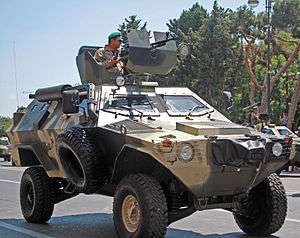 | | MRAP | Cobra I | 200 | Its suspension / wheel base is based on the American HMMWV which led some to mistakenly claim that Turkey actually uses the HMMWV as one of its utility vehicles.[12] |
| Cadillac Gage Commando | 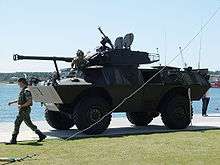 | | Armored Personnel Carrier | V-150S | 124 | Lacking a dedicated vehicle for its reconnaissance battalion's Turkey ordered 124 LAV-150 vehicles in 1992 from the Cadillac Corporation.[13] |
| Otokar ZPT |  | | Armored Car | 250 | After the cancellation of Akrep, Otokar started to produce cheaper alternative for the law enforcement agencies and the army. ZPT is based on Shorland S-55. | |
| BTR-60 | | | Armored Personnel Carrier | BTR-60PB | 323[5] | Bought from ex-GDR stockpile after German unification. All modernized. |
| Condor |  | | Armored Personnel Carrier | Condor 1 | 25[5] | |
| Dragoon | | | Armored Personnel Carrier | Dragoon 300 | 60 | |
| Helicopters | ||||||
| UH-60 Black Hawk |  | | Utility helicopter | S-70A | 28 | Avionics upgraded by Aselsan. |
| UH-1 Huey | 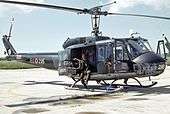 | | Utility helicopter | AB-205 | 13 | Avionics upgraded by Aselsan. |
| Mil Mi-17 | 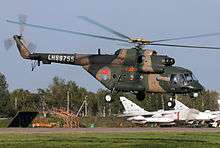 | | Utility helicopter | Mi-17 IVA | 18 | Avionics upgraded by Aselsan. |
Insignia
| NATO code | OF-10 | OF-9 | OF-8 | OF-7 | OF-6 | OF-5 | OF-4 | OF-3 | OF-2 | OF-1 | OF(D) | Student officer | ||||
|---|---|---|---|---|---|---|---|---|---|---|---|---|---|---|---|---|
(Edit) |
 |
|
 |
 |
 |
 |
 |
 |
 |
 |
 |
 |
No insignia | |||
| Mareşal1 | Korgeneral | Tümgeneral | Tuğgeneral | Albay | Yarbay | Binbaşı | Yüzbaşı | Üsteğmen | Teğmen | Asteğmen | Harbiyeli | |||||
| NATO Code | OR-9 | OR-8 | OR-7 | OR-6 | OR-5 | OR-4 | OR-3 | OR-2 | OR-1 | |||||||||||||||||||||||||
|---|---|---|---|---|---|---|---|---|---|---|---|---|---|---|---|---|---|---|---|---|---|---|---|---|---|---|---|---|---|---|---|---|---|---|
| (Edit) |
 |
 |
 |
 |
 |
 |
 |
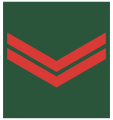 |
 |
 |
No Insignia | |||||||||||||||||||||||
| Astsubay Kıdemli Başçavuş |
Astsubay Başçavuş |
Astsubay Kıdemli Üstçavuş |
Astsubay Üstçavuş |
Astsubay Kıdemli Çavuş |
Astsubay Çavuş |
Uzman Çavuş |
Çavuş | Uzman Onbaşı |
Onbaşı | Er | ||||||||||||||||||||||||
- OF3, OF2, & OR2 translate to "Head of 1000", "Head of 100", and "Head of 10" respectively.
See also
- List of General Commanders of the Gendarmerie of Turkey
- Constabulary
- Gendarmerie
- Military equipment of Turkey
References
- ↑ "Jandarma Genel Komutanlığı". Jandarma.gov.tr. Retrieved 27 November 2015.
- ↑ "TSK Mevcut Personel Sayısını Açıkladı". Aktif Haber. 2 January 2014. Retrieved 27 November 2015.
- ↑ "Türk Silahlı Kuvvetlerinin Barışı Destekleme Harekâtlarına Katkıları". tsk.tr. Retrieved 18 June 2014.
- ↑ "THE SHORT HISTORY OF THE GENDARMERIE GENERAL COMMAND". Jandarma.tsk.tr. Retrieved July 25, 2013.
- 1 2 3 Pike, John. "Jandarma". GlobalSecurity.org. Retrieved 2015-12-01.
- ↑ "Organizational Structure". General Command of Gendarmerie. Retrieved 2008-11-22.
- ↑ John Pike. "Turkey - Gendarmerie General Command Jandarma Genel Komutanlýðý". Globalsecurity.org. Retrieved 27 November 2015.
- 1 2 3 4 5 6 7 8 9 10 11 12 13 14 15 16 17 18 19 20 21 "Jandarma Komutanligi". Turkish Gendarmerie. Retrieved 2013-10-22.
- ↑ "'Hayata Dönüş' ilk kez gün ışığına çıktı". Radikal.com.tr. 7 July 2009. Retrieved 27 November 2015.
- ↑ Archived September 12, 2012, at the Wayback Machine.
- ↑ http://www.armyrecognition.com/turkey_turkish_army_wheeled_armoured_vehicles_uk/kirpi_bmc_350_mrap_armoured_vehicle_personnel_carrier_data_sheet_specifications_description_pictures.html
- ↑ "Otokar Cobra is a true all-terrain fighting machine". Fox News. Retrieved 20 September 2015.
- ↑ "LAV-150". The actual source is by Army Guide _http://www.army-guide.com/eng/product3942.html_ but its been black listed for an unknown reason. Retrieved 29 January 2016. External link in
|work=(help) - ↑ Chief of the Army General Staff.
External links
| Wikimedia Commons has media related to Gendarmerie of Turkey. |
